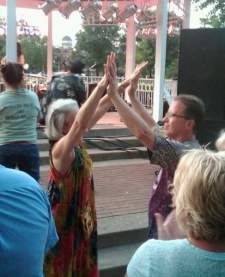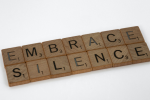July 14, 2011
Ecstasy
 I have taken the exact same vacation for the past 17 years. I return to Ohio for the Community Festival (Comfest), and then my wife, El, joins me and a bunch of friends at a cabin in Ohio’s Hocking Hills. Then we head to Pelee Island in Lake Erie for a week with more friends at a friend’s cottage.
I have taken the exact same vacation for the past 17 years. I return to Ohio for the Community Festival (Comfest), and then my wife, El, joins me and a bunch of friends at a cabin in Ohio’s Hocking Hills. Then we head to Pelee Island in Lake Erie for a week with more friends at a friend’s cottage.
It always starts with three days of dancing. Over 600 local bands perform on six stages before 80,000 people at Comfest. I dart from stage to stage, getting in as many as 16 sets in the three-day period. My goal is to have an ecstatic experience.
One of the goals of religious experience since the dawn of humankind has been to achieve ecstasy. In an article for the Huffington Post, Rabbi Eric Yoffie wrote:
The future of liberal religion in America depends entirely on its ability to generate experiences of religious ecstasy. Hundreds of articles and books have been written on the decline of liberal religion, and the explanations offered usually depend on sweeping and unproven sociological generalizations: the decline is due to cultural turmoil, or economic dislocation, or confusion about sexual mores, or growing individualism. These ideas are interesting but wrong. Americans are disenchanted with liberal religion because they crave religious passion, because they yearn for moments of religious ecstasy, and because they are disenchanted with religious institutions and leaders who spend too much time talking and who seem genuinely afraid of religious feeling."
 Many Christian traditions offer a gateway to the sublime. Women mystics, in particular, including St. Hildegard of Bingen, Therese of Lisieux and Teresa of Avila, Julian of Norwich all opened their hearts to the overwhelming sense of oneness with God that is available in our tradition.
Many Christian traditions offer a gateway to the sublime. Women mystics, in particular, including St. Hildegard of Bingen, Therese of Lisieux and Teresa of Avila, Julian of Norwich all opened their hearts to the overwhelming sense of oneness with God that is available in our tradition.
In other religious traditions, that experience of the divine is central. The Sufis of Islam, the Yogis of Hinduism, and the monks of Buddhism each found a way through the gate.
Dancing works just fine for me. The spinning, moving, and dipping to the music in a crowd full of people seeking a heightened experience gets me there.
But I shouldn’t have to go to a rock festival to find that experience. It would be wonderful if the worship life in our churches helped people reach an ecstatic union with the divine.
One way our congregation attempts to offer this is through our Sunday evening Taize service. In the simple, repetitive chants sung in harmony in our beautiful, tuned sanctuary something of the ecstatic happens.
Another way is through our practice of Centering Prayer. We have three different sessions a week that provide space for contemplation and an expansive sense of the Spirit.
How do you get there? We all know the shortcuts. But what are the ways to go deep into the divine that are faithful to our tradition and give that felt sense that so many seek of being one with God?





